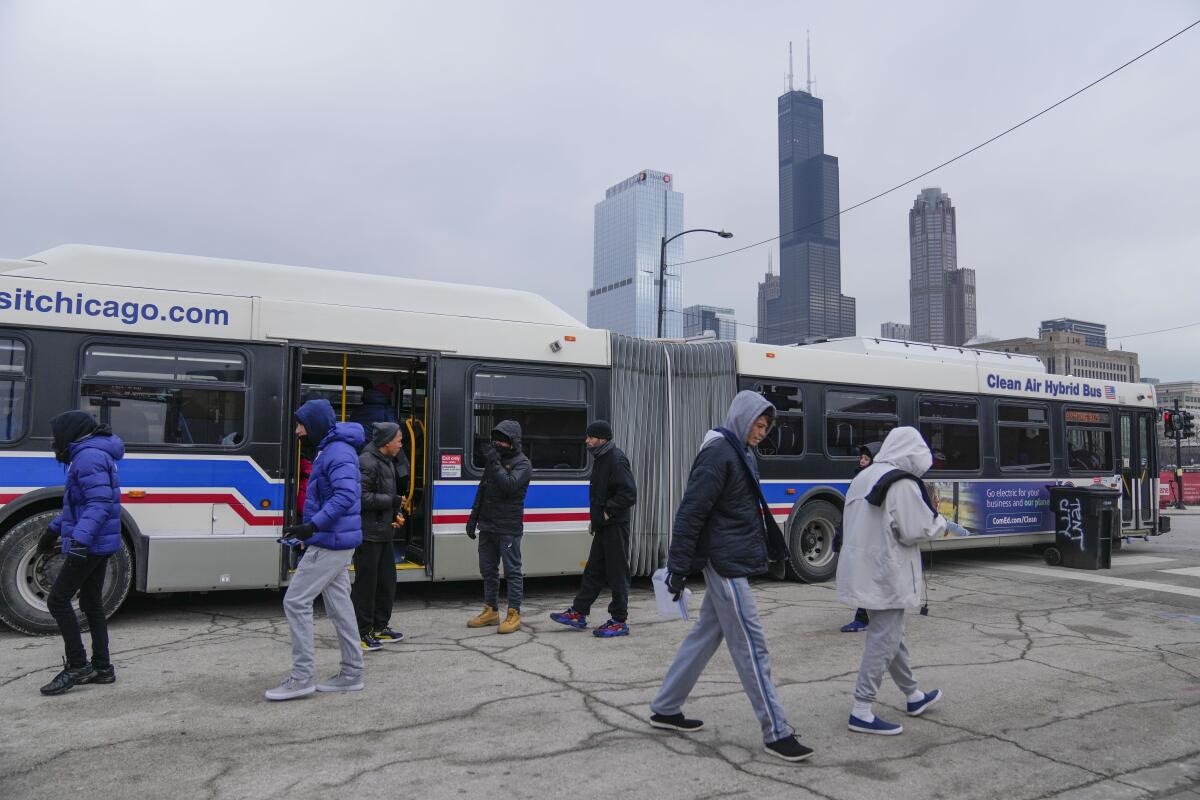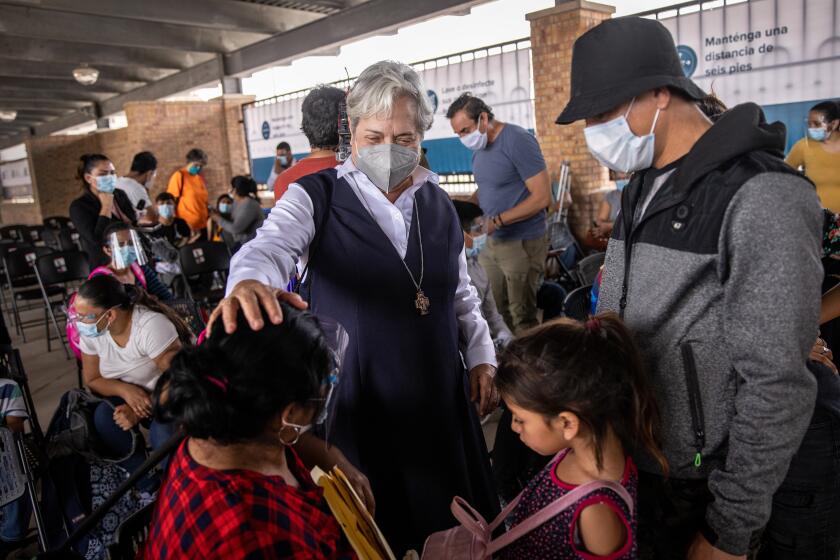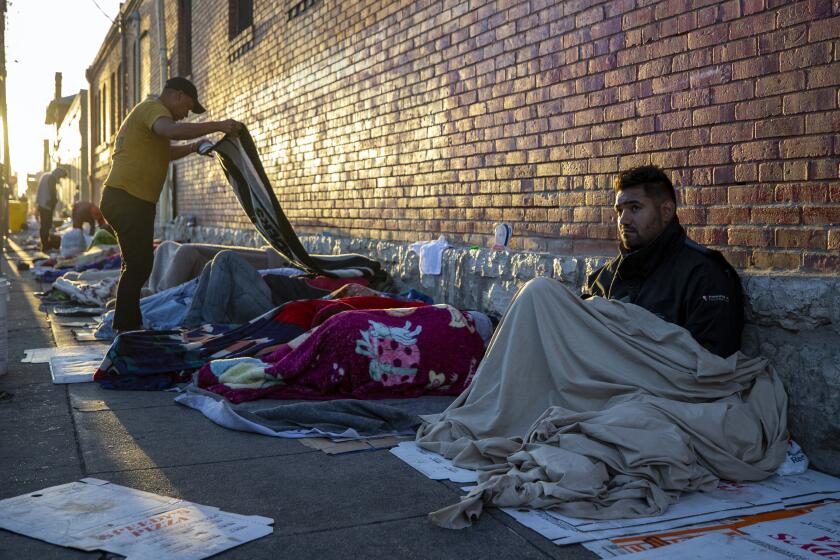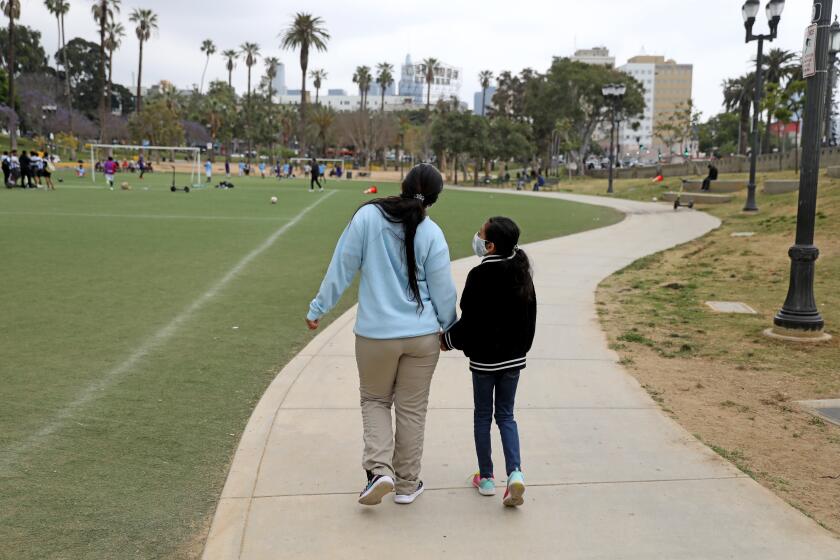Lawsuit against Chicago is the latest legal fight over Texas moving migrants to U.S. cities

- Share via
CHICAGO — A Texas transportation company is taking the nation’s third-largest city to federal court, ratcheting up a legal battle over the migrant crisis that’s left U.S. cities struggling for more than a year.
The lawsuit against Chicago comes amid a larger political battle involving federal immigration policy and arguments about the rights and treatment of asylum seekers.
Here’s a closer look at the situation:
Who is involved?
Since 2022, Texas has sent more than 100,000 migrants to Democratic-led “sanctuary cities,” as it has handled surging numbers at the Mexico-U.S. border in recent years. The state has contracts with multiple bus companies to send asylum seekers north and recently began chartering planes.
Texas Gov. Greg Abbott said he launched his busing operation to ease the burden on border cities, adding that the federal government needs to take action on immigration reform. He argues that migrants choose their destinations, get free tickets and the cities should live up to their promise of welcoming all.
But the influx has overwhelmed major U.S. cities, namely Chicago, New York and Denver, with mayors making their own pleas for federal help.
They call Abbott’s approach inhumane, with buses arriving at all hours and with no passenger lists or coordination, particularly for people who have already faced long, often dangerous, journeys to get to the United States. Many migrants, mostly from Venezuela, have been arriving in the brutal cold without winter coats.
Sister Norma Pimentel, a nun famous for her compassion toward migrants, said that parties on both sides of the aisle turned the bus carrying migrants from Texas to L.A. into a spectacle.
“The lack of care that has been on display for the last year and a half has created an incredible amount of chaos,” Chicago Mayor Brandon Johnson said at a news conference with other mayors last month.
New York Mayor Eric Adams traveled to Latin America to dissuade people from making the trip, while Johnson sent a delegation to border cities in hopes of improving communication.
The lawsuit
The lawsuit by the Texas-based Wynne Transportation against Chicago was filed in early January but received little attention until local media reported on it recently. Gov. Abbott’s administration had contracted the transportation company that is based in Irving, Texas, near Dallas, to transport migrants.
Late last year, Chicago cracked down on what it called “rogue buses” and passed rules requiring them to drop off passengers during particular hours in a stretch of downtown designated as “the landing zone.”
Migrants in Texas say contractors working for Florida Gov. Ron DeSantis pushed them to board flights to California, promising shelter and immigration aid.
The company’s subcontractors have since been the target of more than 90 suits filed by Chicago, with potential fines between $2,000 and $10,000, said Michael Kozlowski, a Chicago attorney representing Wynne.
“That interferes with their business a great deal, and it’s intimidating for these subcontractors who are mostly smaller operators,” Kozlowski said.
The complaint filed Jan. 5 in federal court in Chicago argues that the city overstepped by regulating immigration, regulating interstate commerce and violated the equal rights and due process of the company and the migrants on buses.
The city’s regulations are a heavier burden for out-of-state bus operators compared with Illinois-based operators routinely carrying people around the metro area, Kozlowski said.
“Chicago is turning its back on those wishing to travel here by enacting an ordinance that targets the transportation companies that transport migrants from our southern border to their desired destination — Chicago — in violation of Plaintiff’s constitutional rights,” the company argued.
The suit repeatedly references passengers’ rights and suggests that Chicago is discriminating against migrants by regulating bus operators.
No asylum seekers are named as plaintiffs along with Wynne Transportation.
Steven D. Schwinn, professor of law at the University of Illinois at Chicago, said the absence of migrants in the lawsuit “gives away the game” of the intent behind the suit.
.
More than 21,600 migrants have been transported across the country from Texas, under a plan hastily instituted by Gov. Greg Abbott last year. Forty-two arrived in L.A. last week.
“So much of the complaint talks about the effect on migrant rights, immigrant rights, equal protection, discrimination against migrants and yet there are no migrants as part of this lawsuit,” Schwinn said. “That tells me that this is really about politics.”
However, Kozlowski said the company can make that argument on passengers’ behalf.
Schwinn said the city has a strong argument in favor of regulating bus companies: protecting new arrivals’ health and safety when they arrive in need of shelter, food and other resources the city is trying to provide.
Chicago’s recent stretch of subzero temperatures adds weight to that motive, he said.
Chicago officials declined to comment Wednesday.
“The city does not comment on pending litigation,” said the city’s Law Department spokeswoman Kristen Cabanban.
Nadav Shoked, a professor of law at Northwestern University School of Law, said Wynne may struggle to show the city is overly burdening out-of-state operators.
“The ordinance is drafted in such a way that it doesn’t stop you from being boarded on a bus and arriving,” he said. “It just sets conditions for where buses can stop and at what time of day.”
Why now?
The lawsuit against the city steps up the legal battle between Texas and the sanctuary cities, namely Chicago and New York.
Chicago has received nearly 35,000 migrants, mainly on buses from Texas. But they have also arrived from other cities and via plane.
Chicago has filed nearly 100 complaints against bus companies, impounded vehicles and issues thousands of dollars in fines. New York City instituted similar rules last month and sued more than a dozen bus companies this month.
Chicago and other northern cities scramble to house asylum-seekers sheltering on sidewalks, at police stations and at the airport as cold weather sets in.
To skirt the rules, the buses began dropping off migrants in suburbs miles away from the city, also at all hours and with no warning. That prompted city-suburb squabbles and a summit in the coming days between the mayors of Chicago and several area suburbs.
“The governor of Texas needs to take a look in the mirror of the chaos that he’s causing for this country,” Johnson told reporters last month.
In response, Abbott began chartering private planes to Chicago and New York.
“Sanctuary city Chicago started obstructing and targeting our busing mission. Texas will now expand our operation to include flights to Chicago,” Abbott said on X, formerly Twitter.
What’s next?
Chicago has not yet filed a response to the complaint, and no hearings have been scheduled.
Kozlowski said he didn’t know of plans to file similar suits in other cities.
“I would hope a decision on the Chicago ordinance would spur those other areas into examining their own ordinances and making sure they comply with the Constitution,” he said.
Buses keep coming daily. More than 600 buses carrying migrants have arrived in Chicago since August 2022.
“Until Biden reverses course on his open border policies, Texas will continue transporting migrants to these cities,” Abbott said on the social media platform X. “We will not back down on our efforts to secure the border.”
For Chicago and other cities, that has meant repeated stopgap efforts to shelter migrants, including the use of parked city buses, police station lobbies, libraries and airports. Johnson, Adams and other city leaders have pleaded with their states and the Biden administration for more money.
Asylum seekers, meanwhile, face a lengthy wait — as much as two years — for hearings in the country’s overloaded immigration court system.
More to Read
Sign up for Essential California
The most important California stories and recommendations in your inbox every morning.
You may occasionally receive promotional content from the Los Angeles Times.

















